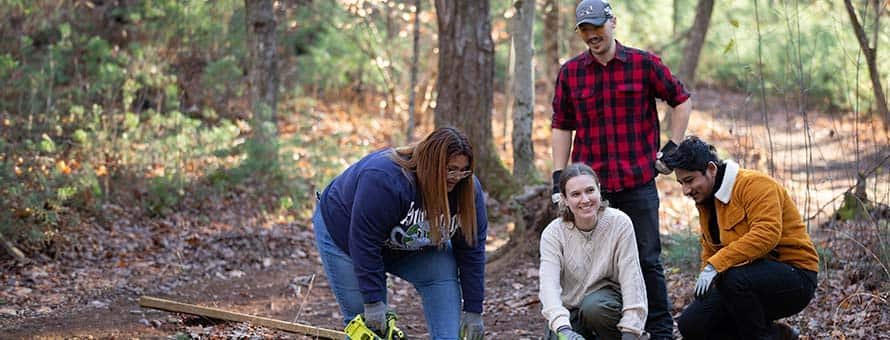
Our Mission
Southern New Hampshire University (SNHU) is committed to creating a far-reaching, positive impact throughout our global community by empowering students and employees to advance a sustainable organization and culture. Consistent progress is made by convening stakeholders, measuring our work, and sharing knowledge and successes.
Our Goals
SNHU pursues these individual objectives to help advance our overarching mission.
Planning & Admin
Support environmental sustainability strategic planning that complements and synthesizes priorities within SNHU’s existing tactics.
Operations
Establish comprehensive operational frameworks to reduce our ecological footprint and support an environmentally sustainable model.
Carbon Neutrality
Remain dedicated to our signing of the Second Nature President’s Carbon Commitment, which requires a goal of carbon neutrality.
Academics
Instill a meaningful focus on environmental sustainability and equity in SNHU's academic structure, collective learning and identity.
Engagement
Motivate members of our community to become lifelong global citizens through a holistic approach to communication, education and incentives.
Earning Recognition
 SNHU is the proud recipient of a silver rating under the Sustainability Tracking, Assessment & Rating System™ (STARS®). One factor that led to our silver status was our diversion of more than 20 tons of usable materials and equipment from landfills last year, saving the university almost $10,000 in hauling fees in the process, and redirecting the money to support students and sustainability at SNHU.
SNHU is the proud recipient of a silver rating under the Sustainability Tracking, Assessment & Rating System™ (STARS®). One factor that led to our silver status was our diversion of more than 20 tons of usable materials and equipment from landfills last year, saving the university almost $10,000 in hauling fees in the process, and redirecting the money to support students and sustainability at SNHU.

Our steadfast commitment to sustainability and green cleaning was also recognized in 2024 by ISSA, the worldwide cleaning industry association, with a CIMS-Green Building certification. We are proud to hold this credential, as its mission is to improve performance in the areas of sustainable product usage, improved occupant wellness, asset preservation and waste diversion.
Making Impactful Connections
Second Nature: SNHU is a member of Second Nature's Climate Leadership Network, a program which holds colleges and universities accountable to accelerating climate action.
New Hampshire Businesses for Social Responsibility (NHBSR): We are a sponsoring member of NHBSR and have hosted their annual Sustainability Awards for several years.
Post-Landfill Action Network (PLAN): As an active member of PLAN, SNHU is steadfastly committed to collaborating with their team to achieve a zero-waste future.
Getting Involved
Students, employees and communities alike are encouraged to join our green initiatives, including:
-
SNHU Global Days of Service:
A multi-month community service program in which alumni, students and employees come together across the globe to strengthen our communities. - The Sustainability Community of Practice:
This organization connects employees interested in the business aspect of sustainability who can initiate educational efforts to improve usual practices. - Paid Volunteer Time Off (VTO):
SNHU’s paid VTO program affords employees the chance to get involved with nonprofit charitable organizations that positively impact their communities’ quality of life. - Sustainability Months:
April and October are both chock-full of events designed to inspire the entire SNHU community to celebrate the planet.
- SNHU Environmental Club:
Members of this campus-based club facilitate participation in both outreach and education events. - Sustainable SNHU:
An online student community where emerging sustainable leaders learn, promote and discuss sustainability and earth-conscious topics. - The Student Eco-Rep Program:
Eco-Reps are paid student leaders (campus and online) who work on sustainability-related projects and model/promote environmentally responsible behaviors. Their work encompasses the SNHU Arboretum, outdoor classrooms and more.

On the SNHU Campus?
Here, you'll find the team that pushes SNHU’s eco efforts forward — The Office of Sustainability. You’ll also spot the SNHU Arboretum, spanning 25 acres of forested wetland, and the sea of facilities we’ve optimized to save energy. Plus, this map will come in handy when you’re on the hunt for water refill stations, electric vehicle chargers and more.
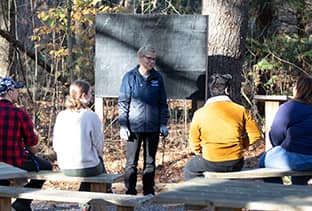
Teaching a Green Curriculum
We help shape future perspectives by weaving sustainability into our academic structure.
Leading the Charge
The Office of Sustainability at SNHU is at the helm of our planet-friendly initiatives.

Mike Weinstein
Founding Director
Mike Weinstein has a decade of teaching experience. In 2017, he established the SNHU Arboretum — the first to be internationally accredited in NH. He holds a PhD in Environmental Studies and Sustainability from Antioch University.

Pamela Beckvagni
Assistant Director of Programs
Pamela Beckvagni has over 25 years of program leadership, implementation, and assessment experience in alternative education, vocational services, sustainability, environmental and waste management, and higher ed.

Jesse Carswell
Sustainability Business Analyst
Jesse Carswell has spent 10 years in higher ed sustainability working with programs, green funds and more. She holds a BS in Environmental Studies from Texas A&M and an MS in Environmental Policy Management from the University of Denver.
Sustainability Reporting
We share these reports to remain transparent about our progress.
- SNHU Sustainability Highlights: An overview of SNHU’s sustainability efforts in 2024.
- STARS report: A transparent, self-reporting framework for colleges and universities to measure sustainability performance.
- SIMAP report: A carbon and nitrogen-accounting platform that can track, analyze, and improve campus-wide sustainability.
Frequently Asked Questions
What does it mean to be a sustainable university?
Being a sustainable university means integrating environmental, social and economic principles into operations to minimize negative environmental impact and promote long-term sustainability.
SNHU has embraced this opportunity by adopting a sustainability mission that encompasses environment-friendly goals within the areas of planning and administration, operations, carbon neutrality, academics and engagement.
What are the benefits of a sustainable university?
The benefits of being a sustainable university are far-reaching.
Beyond environmental conservation, SNHU has noted key advantages in areas like:
- Student engagement: SNHU’s Student Eco-Rep Program encourages students to model and promote responsible sustainability behaviors to educate their peers.
- Research opportunities: The SNHU Arboretum acts as host to a variety of student-led research monitoring projects, including environmental and climate condition reporting.
- Community relations: One of our most gratifying outreach projects in 2023 was the construction of 3 outdoor classrooms at public schools in Manchester, New Hampshire.
Of course, these are just a few of many benefits that have materialized from our sustainability efforts — the list truly goes on and on.
Why are colleges and universities suited for the role of environmental leadership?
Colleges and universities are suited for the role of environmental leadership thanks to their influential role in education, research, innovation and community engagement.
SNHU is proud to foster creative solutions to environmental challenges that help shape the perspectives of future leaders. We set a positive example through sustainable campus operations, community engagement, green curricula, partnerships with environmentally conscious organizations and more.
What can universities do about climate change?
Universities can make a positive impact on climate change by integrating sustainability into their operations, curricula and culture.
At SNHU, we’ve implemented changes of all kinds in hopes of making a difference. Adding lighting control systems to our facilities. Offering paying jobs to advance sustainability across SNHU with our Student Eco-Rep Program. Teaching a green curriculum. We've accomplished this — and so much more — with no intention of slowing down!
Related Articles
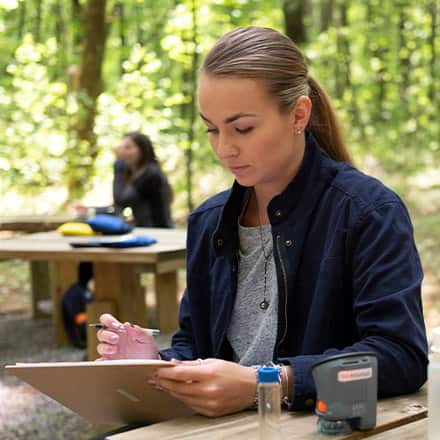
What is Environmental Sustainability? Goals With Examples
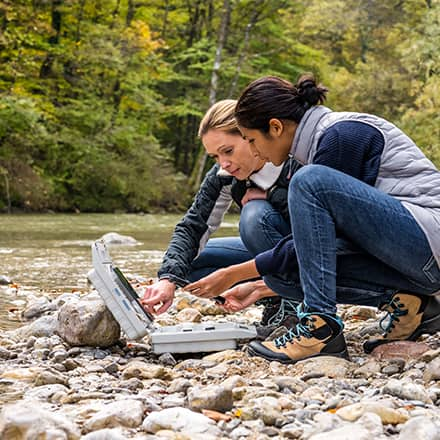
What Can I Do With an Environmental Science Degree?
Environmental science is the study of how the natural world works, how we interact with it and how we can preserve it. If you want to solve real-world environmental problems and promote a sustainable planet, the study of environmental science may be for you.
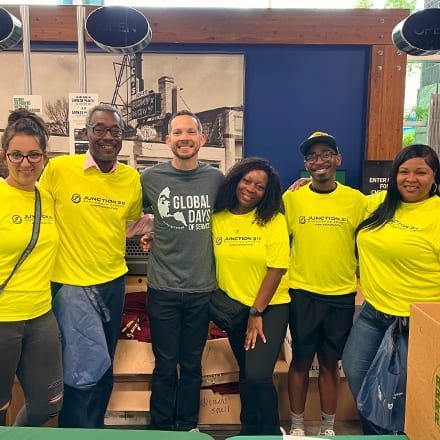
SNHU Community Volunteers More Than 9,000 Hours of Service This Spring
More than 1,648 SNHU students, staff, faculty, alumni and volunteers contributed over 9,196 hours of service during the university’s 8th annual Global Days of Service. Participants had the opportunity to join an official project in their area or take part in a do-it-yourself project this spring.

